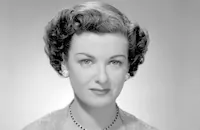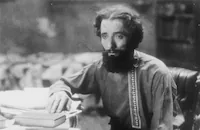Moby Dick

Brief Synopsis
Cast & Crew
Lloyd Bacon
John Barrymore
Joan Bennett
Lloyd Hughes
May Boley
Walter Long
Film Details
Technical Specs

Synopsis
[The plot is similar to that of the 1926 silent film The Sea Beast , which is given below; character names refer to that film.] Ahab Ceeley and his half brother, Derek, are rivals for the hand of Esther Harper, a minister's beautiful daughter. Because Esther favors his brother, Derek pushes Ahab overboard on a whaling trip; Ahab's leg is chewed off by Moby Dick, a white whale; and he returns to Esther a broken and embittered man. Ahab, believing that Esther no longer loves him, becomes captain of a whaler and obsessively sets out to kill Moby Dick. Ahab learns of Derek's treachery and, after killing the whale, kills Derek. Ahab returns to New Bedford and, his obsession gone, settles down with Esther.

Director

Lloyd Bacon
Cast

John Barrymore

Joan Bennett

Lloyd Hughes
May Boley
Walter Long
Tom O'brien

Nigel De Brulier
Noble Johnson
William Walling
Virginia Sale
Jack Curtis
John Ince
Crew

Film Details
Technical Specs

Articles
Moby Dick (1930)
The creation of a love interest for Captain Ahab is one of many liberties the Warner Bros. screenwriting team take with Melville's book in both of the Barrymore screen versions. In this Moby Dick, Ahab's motivation for hunting down the whale is simple revenge, since the creature has destroyed his romance with Faith by causing him to lose a leg. The book's famous first-chapter opening line, "Call me Ishmael," is gone since the character of Ishmael has been eliminated. The script even dares to substitute a different beginning for the novel and attribute it to Melville! Other added elements include an evil brother who wants Faith for himself, and a completely different ending.
Perhaps to accommodate Barrymore's own proclivities, Ahab is portrayed in the movie as a hard-drinking scalawag. Bennett would later say that she did not see her costar drink a drop throughout the entire filming. But, as biographer Margot Peters writes in her book The House of Barrymore, this was "no evidence at all since Jack, like all alcoholics, was diabolically clever at tippling in secret." Peters also notes that Barrymore looks "shockingly older" than he had in The Sea Beast only four years earlier, "something which his opening acrobatics up in the crow's nest only emphasize."
Despite all this, Moby Dick emerged as one of Barrymore's biggest box-office hits and enhanced Bennett's budding movie career. The film is noteworthy for an early, experimental use of widescreen. As the first chase for Moby Dick begins, the screen widens. Then, when the whale closes in on Ahab, the screen returns to normal dimensions.
Director: Lloyd Bacon
Screenplay: Oliver H.P. Garrett (adaptation), J. Grubb Alexander (screenplay and dialogue), from novel by Herman Melville
Cinematography: Robert Kurrle
Editing: Desmond O'Brien
Special Effects: Fred Jackman
Music Director: Erno Rapee
Principal Cast: John Barrymore (Captain Ahab Ceely), Joan Bennett (Faith Mapple), Lloyd Hughes (Derek Ceely), Noble Johnson (Queequeq), Nigel De Brulier (Elijah).
BW-78m. Closed captioning.
by Roger Fristoe

Moby Dick (1930)
Quotes
Why... Why, Ahab Seeley! You're crying!- Faith Creely
Trivia
This version of "Moby Dick" featured an early, experimental use of widescreen. As the boats were lowered for the first chase after the whale, the screen widened; then, as Moby Dick suddenly closed in on Captain Ahab, the screen returned to its normal size.
For this film, the producers decided not to use the storyline of Herman Melville's original novel, but that of the 'John Barrymore' silent film, Sea Beast, The (1926). "Moby Dick" would not be filmed as Melville wrote it until 1956.
Notes
In 1930, Warner Bros. produced English and German-language versions, entitled Moby Dick and Dämon des Meeres. For information on other film versions of Melville's novel, see entry for the 1956 Warner Bros. production of Moby Dick in AFI Catalog of Feature Films, 1951-60.














